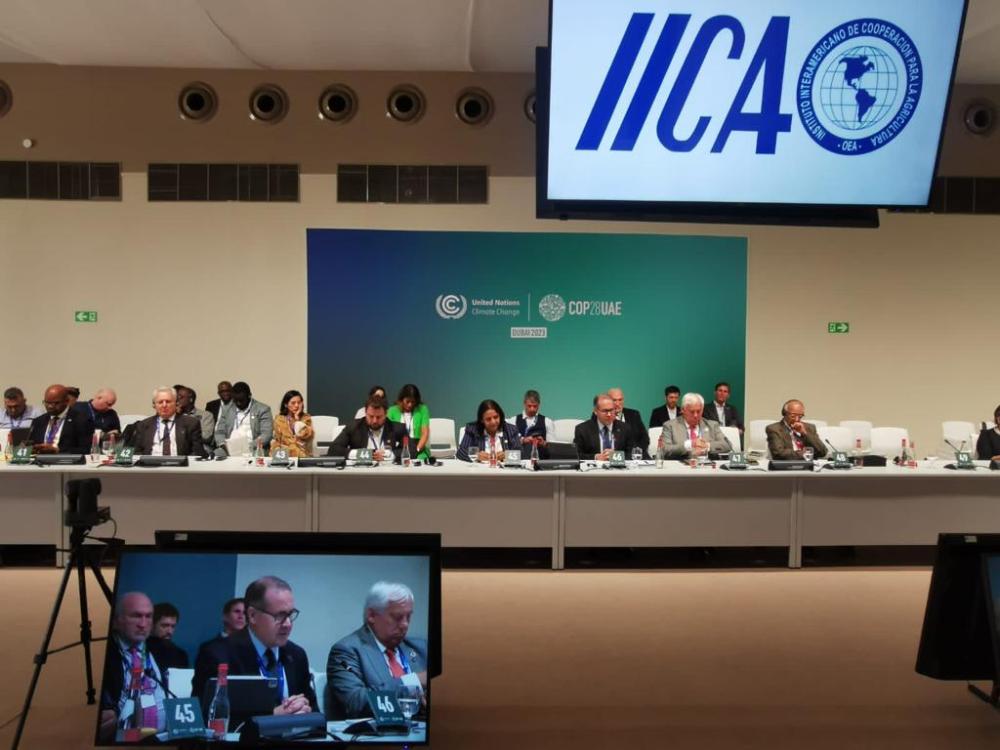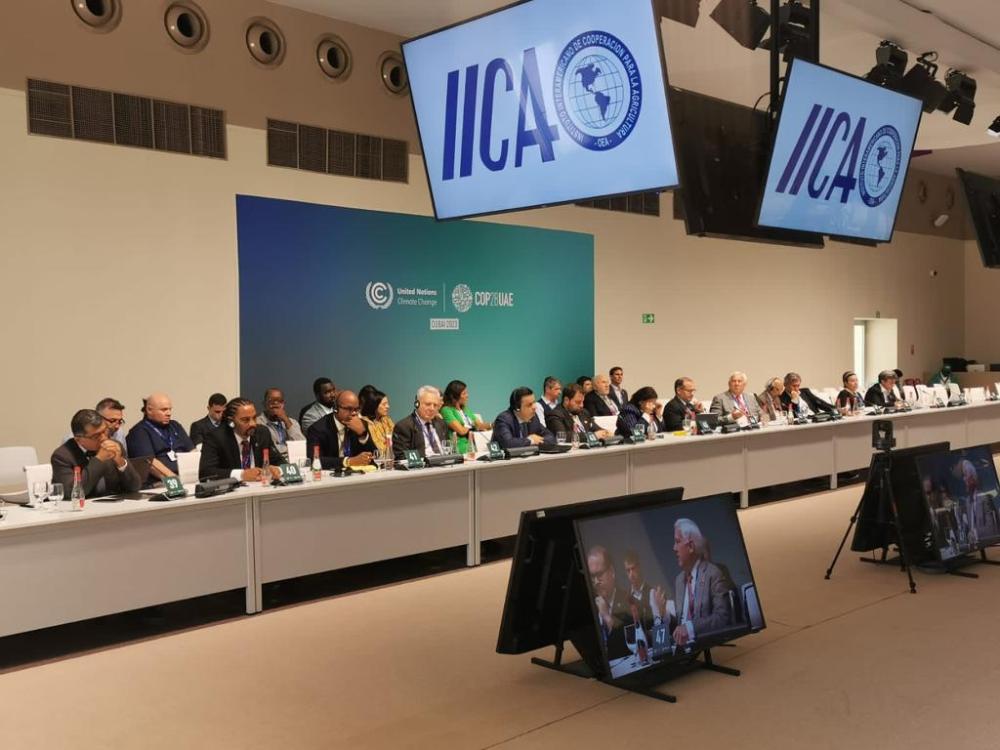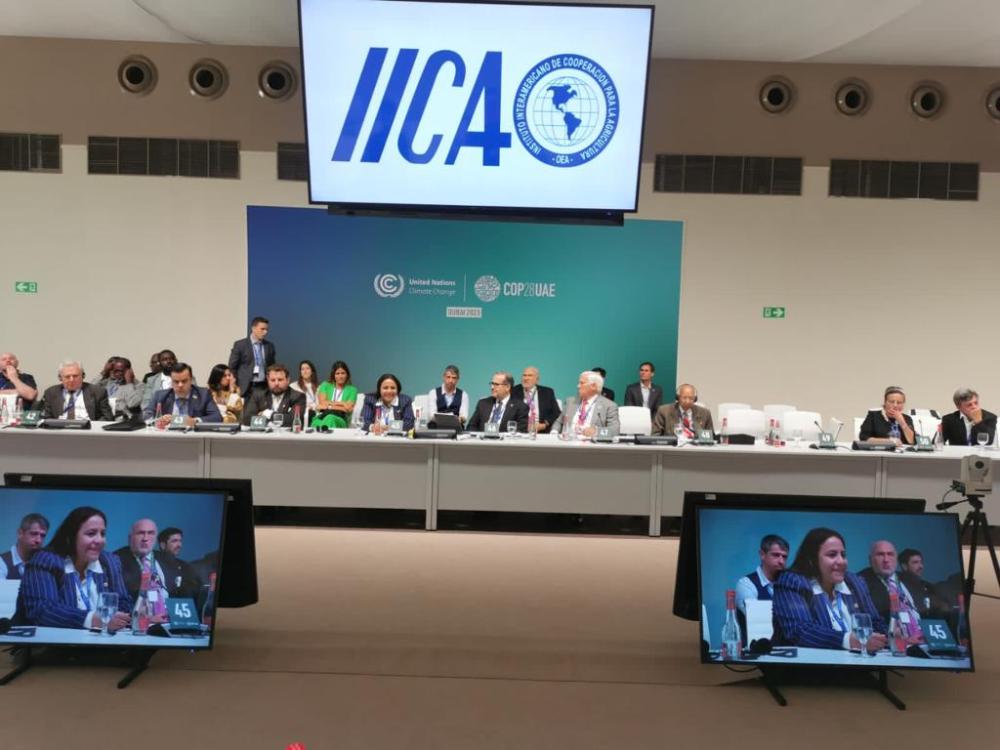At COP28, together with IICA, ministers and senior agricultural officials of the Americas demonstrate sector’s commitment to global climate agenda

Dubai, United Arab Emirates, 12 December 2023 (IICA) - Ministers and senior agricultural officials of Latin America and the Caribbean gathered in one of the main halls of the COP28 presidency in Dubai, where they strongly conveyed the agriculture sector’s commitment to the global climate change mitigation and adaptation agenda.
The participants warned that, in any future scenario, the region is destined to play a strategic role in the planet’s food security and environmental sustainability. From an environmental perspective, they maintained that the magnitude and diversity of the region’s natural resources make the American hemisphere a decisive player in achieving carbon-neutral modes of production and consumption, preserving biodiversity and sustaining water and oxygen cycles around the world.
Organized by the Inter-American Institute for Cooperation on Agriculture (IICA), the event was widely attended by regional agricultural representatives at the United Nations Climate Change Conference in the United Arab Emirates. The conference has brought together more than 70,000 world leaders, including officials, representatives of private companies and social movements, and young people from around the world who are working to achieve the goals established in the 2015 Paris Agreement with respect to combating climate change.
Participating in the presentation were the Secretary of Agriculture and Livestock of Honduras, Laura Suazo; the Secretary of Agriculture and Rural Development of Mexico, Víctor Villalobos; and the Minister of Agriculture, Fisheries and Blue and Green Economy of Dominica, Roland Royer.
Other speakers included Roberto Perosa, Secretary of Trade and International Relations of the Ministry of Agriculture and Livestock of Brazil; Francisco Minuche, Deputy Minister of Rural Development of Ecuador; Víctor Hugo Parra, Deputy Minister of Agricultural Development Policies and Supervision of Peru; Rattan Lal, 2020 World Food Prize winner and IICA Goodwill Ambassador; Marcelo Torres, President of the Argentine Association of Direct Seeding Producers (AAPRESID); Silvia Naishtat, senior journalist and editor of Clarín newspaper in Argentina; and Manuel Otero, Director General of IICA.
Lloyd Day, Deputy Director General of IICA, delivered the opening remarks. Also in attendance were Jorge Molina Arambarri, Ambassador of Argentina to the United Arab Emirates, and Creston Buffonge, Minister of Agriculture of Monserrat, a member of the Organization of Eastern Caribbean States (OECS).

As they did at the United Nations Food Systems Summit in 2021 and at COP27, held in Egypt in 2022, the ministers of Agriculture, alongside IICA, presented a united position to guarantee global food security and defend common interests.
In October, at the Conference of Ministers of Agriculture of the Americas, they also reached consensus on and supported the establishment of a Hemispheric Partnership for Food Security and Sustainable Development, launched by IICA.
Agrifood production in Latin America is crucial for the economies of countries. In recent decades, the region has become the world’s largest net exporter of food, a role it must continue to fulfill, given the opportunities at its disposal to increase production.
Agriculture’s participation in climate discussions
“Fortunately, agriculture has been an important topic of the negotiations and discussions at this year’s COP28, and the sector has attracted the attention of the global community”, considered Villalobos.
The Mexican Secretary of Agriculture explained that water availability creates the greatest level of uncertainty for agricultural production. “Droughts have been affecting different countries in South America, as well as the southern region of the United States and northern Mexico. But we know that there is plenty of room to reduce water use in agriculture without sacrificing productivity. We are working hard to achieve this through various projects with farmers”, he added.
Roberto Perosa remarked that, five decades ago, Brazil was a food importer but, thanks to the country’s investment in technology and research, it is now the world’s largest food exporter.
“We produce more than one billion tons of food per year for the world”, he explained. “Therefore, we have a tremendous responsibility. We have assumed an environmental commitment, reducing deforestation by 30% this year. We have 50 million hectares of degraded pastures that we are going to recover and use for production, in order to prevent agriculture from taking over forests”.
Perosa stated that Brazil rejects unilateral positions regarding production methods, and questioned the international trade restrictions that the European Union is trying to impose using environmental arguments.
“Climate change directly impacts agriculture, which is between a rock and a hard place. Latin America is paying the price with its resources: fresh water, soil health and also human labor”, stated Laura Suazo.

The Secretary, the first woman ever to lead the Secretariat of Agriculture of Honduras, remarked that, “In Central America, we are more united than ever in the search for solutions and efforts to guarantee food access in the Central American Dry Corridor. We continue emphasizing the need for investment to mitigate global warming, but we lack sufficient funding to adopt climate-smart technologies. Moreover, we are not investing in the prevention of disasters caused by climate change”.
Cultivating carbon
Renowned scientist Rattan Lal, Professor of Soil Sciences and Director of the Lal Carbon Center at The Ohio State University, delivered a presentation to ministers and attendees in which he explained how agriculture can mitigate greenhouse gas emissions while also sequestering carbon.
According to Lal, agriculture can aim not only to be carbon neutral, but to achieve a negative greenhouse gas balance that significantly contributes to climate change mitigation.
“Agriculture has a bright future ahead. More changes will occur between 2020 and 2050 than in the last 12,000 years and IICA, in partnership with The Ohio University, has a fundamental role to play”, he said.
Manuel Otero explained that the countries of the region, cognizant of their duty with respect to global food security and the challenges posed by the Sustainable Development Goals (SDGs) and the Paris Agreement, have been participating, with IICA’s support, in various international discussion and negotiation forums to present the region’s perspective, harmonize positions and leverage resources to achieve common interests.
“IICA supports all initiatives aimed at driving agricultural transformation. The sector must be viewed as part of the solution to climate change, with farmers playing a key role in these changes, which must be based on science. Agrifood systems in our region are not failed systems, which is a narrative we do not support. There is room for improvement, of course, and a strong commitment in that regard on the part of countries, the private sector and farmers, as has been demonstrated at COP28”, he noted.
In closing the event, Lloyd Day highlighted the extraordinary wealth of natural resources of the Latin American and Caribbean region.
“We live in a beautiful, productive region. We are the world’s food basket. So, we must not only care for our soil and water, but also for our rural communities, so that we may continue to produce in a clean manner, using fewer resources, for the benefit of the planet”, he concluded.
More information:
Institutional Communication Division.
comunicacion.institucional@iica.int